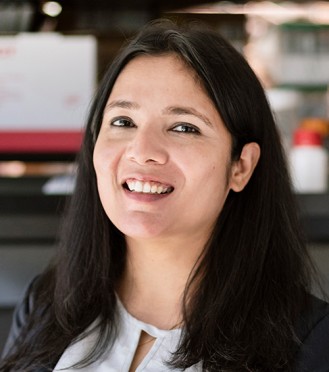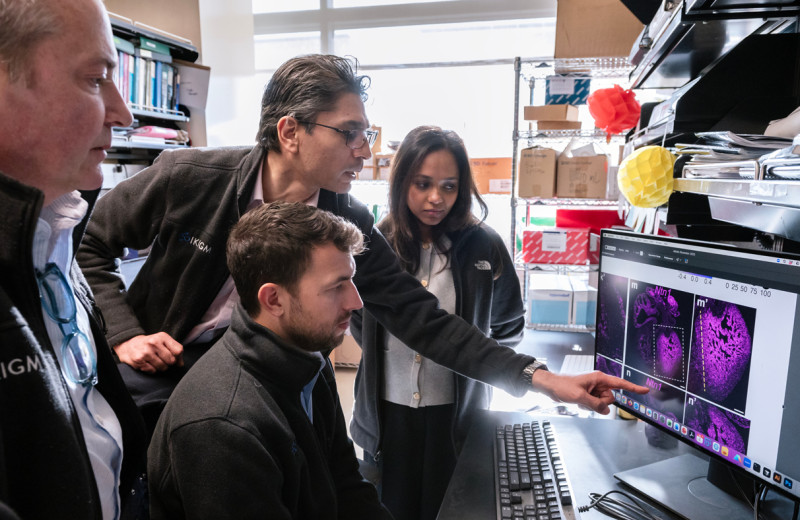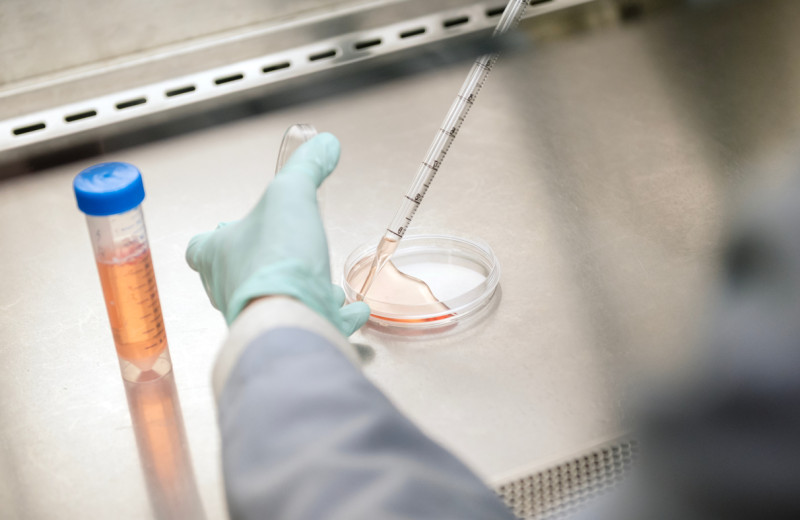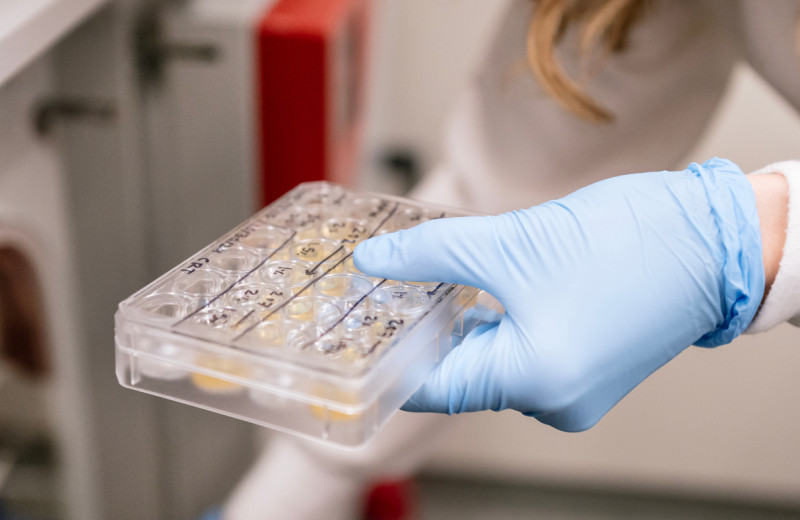Gladstone NOW: The Campaign Join Us on the Journey✕

Leor Weinberger and his team developed a single-dose intranasal treatment that is effective against variants of the SARS-CoV-2 virus. It's based on over 20 years of research on therapeutic interfering particles, often called TIPs.
As the SARS-CoV-2 virus mutates, new variants emerge that can better evade immunity and spread more widely. This causes an ongoing race, in which scientists and pharmaceutical companies must continually test and adapt vaccines to keep up with the latest variant of the virus. This is similar to how the flu vaccine must be redesigned each year to match the newest strains—except that SARS-CoV-2 evolves faster than the flu.
Using a fundamentally different approach, scientists at Gladstone Institutes and VxBiosciences discovered a new type of antiviral that can track the evolution of the virus, which significantly reduces the chance that new variants could reduce the efficacy of the treatment.
In a new study published in the journal Cell, the researchers engineered a single-dose treatment for SARS-CoV-2 that can be delivered intranasally. Their novel approach is based on the concept of therapeutic interfering particles, often called TIPs, which was pioneered by Gladstone Senior Investigator Leor Weinberger, PhD.
He and his team report the discovery of the first TIP, showing it can inhibit SARS-CoV-2 and its variants, and withstand the virus’s ability to evolve new resistant variants. They showed, in animals, that TIPs dramatically reduced the amount of SARS-CoV-2 virus found in the lungs and protected the animals from disease.
“The past 2 years have impressed upon the world how much we need new antiviral strategies,” says Harmit Malik, PhD, professor at the Basic Sciences Division at Fred Hutchinson Cancer Research Center in Seattle, who was not involved in the study. “The design and use of TIPs has always held incredible promise of providing a simple-to-administer, highly effective antiviral strategy that can resist viral adaptation. This study is a true inflection point, showing that the powerful TIPs technology is not just theoretically possible, but imminently within reach.”
A New “Hijacker” Therapy
When a virus like SARS-CoV-2 infects a cell, it takes over the cell’s machinery and transforms it into a factory to produce more virus. TIPs are designed to exploit the virus’s machinery, converting the infected cell from a virus-producing factory into a therapy-producing factory. If the virus is said to hijack the cell, the TIP “hijacks the hijacker.”
And as the virus evolves, TIPs adopt the same mutations as the virus in order to survive, because they need the virus’s machinery to replicate. As a result, TIPs continually track the virus’s evolution.
“Viruses are dynamic, they mutate, yet our current medical countermeasures are static—there is a fundamental mismatch between our tools and the diseases we’re trying to treat,” says Weinberger, William and Ute Bowes Distinguished Professor, director of the Center for Cell Circuitry at Gladstone, and professor of biochemistry and biophysics, and pharmaceutical chemistry at UC San Francisco. “Ultimately, if we want to effectively control viruses like SARS-CoV-2, we will need therapies that bridge this mismatch and keep up with the virus as it evolves.”
Weinberger’s team has now developed a TIP for SARS-CoV-2—the first antiviral with the capacity to track viral evolution.
In the study, the researchers tested the TIP in cells derived from patients. Using lipid nanoparticles (similar to how mRNA vaccines from Moderna and Pfizer are delivered), they also delivered the TIP as a single dose in the nose of live infected hamsters, either before or after infection. The treatment reduced the viral load in the lungs by 100-fold.
They found that TIPs prevented disease by reducing the number of viral particles released from an infected cell. TIPs also reduced the inflammation that can cause many COVID-19 complications and prevented pulmonary edema, the main driver of COVID-19 related deaths. What’s more, only the single dose was required since TIPs could spread their antiviral properties to new cells when the virus was present.
The researchers then demonstrated that TIPs are effective against variants of SARS-CoV-2. They specifically tested the Alpha variant first identified in the United Kingdom and the Beta variant first identified in South Africa, as well as TIPs’ potential against the SARS virus that spread in 2003. They are now testing against new variants.
“Our study provides proof-of-concept that TIPs could overcome the need to constantly update our therapies and vaccines to fight against new virus mutations,” says Sonali Chaturvedi, PhD, first and co-corresponding author of the study and research investigator at Gladstone. “In the case of SARS-CoV-2, this single-administration intranasal treatment could provide longer lasting protection against the virus and its variants than current vaccines.”

Sonali Chaturvedi and her colleagues are working to rapidly move this new treatment for SARS-CoV-2 to clinical trials.
Decades in the Making
More than two decades ago, while Weinberger was a graduate student, he proposed the theoretical underpinnings of the TIP concept and how to engineer them, based on discoveries from the 1950s by a Danish microbiologist showing that viruses form defective particles that “piggyback” to interfere with viral replication. The term “TIP” was coined in a follow-up paper published by Weinberger in 2011.
The idea for TIPs was conceived to address problems in HIV treatment with an approach that could overcome antiviral drug resistance and act as a single-administration therapy. It was specifically designed to treat the highest-risk populations in the most resource-limited settings, such as sub-Saharan Africa.
When the COVID-19 pandemic hit, Weinberger and his team were approached by the US government, who was funding their HIV clinical trials, to repurpose the TIP approach to the SARS-CoV-2 virus.
The team is now working in collaboration with VxBiosciences to rapidly move TIPs for both HIV and SARS-CoV-2 to clinical trials, which are already funded by the National Institutes of Health and the US Department of Defense.
“These data show for the first time that the interfering particle concept is a reality in vivo, opening the door for a new class of antivirals that should be broadly applicable when tailored for different viruses,” says Nancy Haigwood, PhD, professor and director of the Oregon National Primate Center, who was not involved in the research. “The current study clearly demonstrates mitigation of inflammation and disease in a relevant model for SARS-CoV-2, and the use of single-dose nasal delivery is icing on the cake. It is welcome news for a disease that has battered the planet’s inhabitants since 2019.”
For Media
Julie Langelier
Associate Director, Communications
415.734.5000
Email
About the Study
The paper “Identification of a Therapeutic Interfering Particle—a single-dose SARS-CoV-2 antiviral intervention with a high barrier to resistance” was published in the print issue of the journal Cell on December 9, 2021.
Other authors include Gustavo Vasen, Michael Pablo, Xinyue Chen, Arjun Kumar, Elizabeth Tanner, Pei-Yi Chen, Blaise Ndjamen, and Melanie Ott from Gladstone; Nathan Beutler, Thomas Rogers, and David M. Smith from UC San Diego; Sylvia Illouz, Donna Rahgoshay, and Robert Rodick from VxBiosciences Inc.; and John Burnett and Leo Holguin from the Beckman Research Institute of City of Hope.
This work was supported by Pamela and Edward Taft, the National Institute on Drug Abuse (grant DP1DA051144-01S1), and a grant from the Military Infectious Diseases Research Program (MTEC 2020-492) to VxBiosciences Inc.
About Gladstone Institutes
Gladstone Institutes is an independent, nonprofit life science research organization that uses visionary science and technology to overcome disease. Established in 1979, it is located in the epicenter of biomedical and technological innovation, in the Mission Bay neighborhood of San Francisco. Gladstone has created a research model that disrupts how science is done, funds big ideas, and attracts the brightest minds.
Featured Experts
Support Our COVID-19 Research Efforts
Gladstone scientists are moving quickly to respond to the coronavirus outbreak. Help us end this pandemic.
Disrupted Boundary Between Cell Types Linked to Common Heart Defects
Disrupted Boundary Between Cell Types Linked to Common Heart Defects
Gladstone scientists identified a cellular boundary that guides heart development and revealed how disrupting it can lead to holes in the heart’s wall.
News Release Research (Publication) Congenital Heart Disease Cardiovascular Disease Bruneau LabGene Editing Strategy Could Treat Hundreds of Inherited Diseases More Effectively
Gene Editing Strategy Could Treat Hundreds of Inherited Diseases More Effectively
Scientists at Gladstone show the new method could treat the majority of patients with Charcot-Marie-Tooth disease.
News Release Research (Publication) Neurological Disease Conklin Lab CRISPR/Gene EditingGenomic Maps Untangle the Complex Roots of Disease
Genomic Maps Untangle the Complex Roots of Disease
Findings of the new study in Nature could streamline scientific discovery and accelerate drug development.
News Release Research (Publication) Marson Lab Genomics Genomic Immunology




